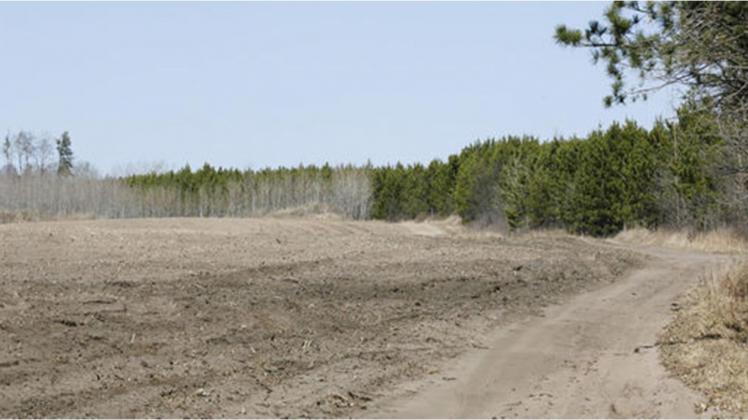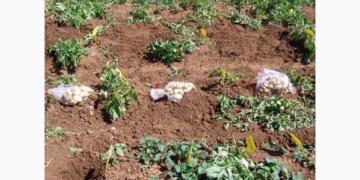Canadá: Potato grower’s move into forest land raises water, wildlife concerns
MENAHGA, Minn. Sunbathing outside her house on a mild Tuesday, Judy Maaninga reclined with her back to a thin row of jack pines. Just beyond that, an expanse of sand stretched under blue sky.

This was no lakeshore beach, rather a sandy farm field that was once a forest. Now, the sweeping arm of an irrigation system is all that rises above the bare land.
For years, Potlatch Corp. logged the woods that abutted Maaninga’s property outside Menahga, until 2012 when the acres were sold to R.D. Offutt Co., the nation’s largest potato grower.
And with that, the clear-cutting of trees commenced, making space for potatoes--a crop that thrives in sandy soil with the help of irrigation.
This story of deforestation has been playing out across north-central Minnesota in recent years. Offutt, a Fargo, N.D., company, has bought several thousand acres of timber land in Wadena, Cass, Becker and Hubbard counties, and has cleared much of it to raise crops above the vulnerable Pineland Sands Aquifer.
The massive change in the landscape, fears of groundwater overuse, the risk of nitrogen fertilizer contaminating the drinking water--all this has some locals fuming.
"I don’t think we’re being really good stewards," said Menahga Mayor Pat Foss. "I think we’re trying to make the money today and forget about tomorrow."
Offutt spokeswoman Anne Struthers said turning forests into fields creates room for the company to switch from a three-year to a four-year crop rotation--a move meant to make its farming more sustainable. "We’re not trying to grow more potatoes," she said.
Regardless of Offutt’s intentions, the pine-to-potatoes trend has the attention of the Minnesota Department of Natural Resources, which called a timeout on Offutt’s drilling of irrigation wells in February. Citing concerns about potential threats to water quality, water supplies and wildlife, the agency announced plans for an environmental assessment worksheet (EAW) to take a closer look at the effects of Offutt’s expansion before issuing well permits.
A major question for the agency is how the loss of forest cover--along with the fertilizing and irrigating of crops in sandy, permeable soil--will affect the Pineland Sands Aquifer, which is directly connected to lakes, streams and wetlands.
"If you pour water through sand, you know that it drains through pretty quickly, and there’s not a lot of confining layers or barriers for that water moving down into the aquifer," said Bonnie Keeler, a scientist at the University of Minnesota’s Institute on the Environment.
In these conditions, the DNR says, avoiding nitrate contamination from fertilizer is difficult. And such pollution wouldn’t only affect local well water, but also surface water that flows to the Mississippi River and becomes drinking water for millions of Minnesotans as far downstream as the Twin Cities.
Water worries
For more than 30 years, Maaninga and her husband lived ensconced by woods. Since the neighboring pines were chopped down, bear and deer still visit the couple’s property, but part of the forest soundtrack has been muted. "We’ve noticed the songbird population has really declined," the 57-year-old grandmother said.
Right after an irrigation well was drilled for the adjacent field, the couple noticed that their water, which comes from a well 12 feet beneath their basement floor, tasted like mud.
"It cleared out, but we’re cautious about drinking it," said Maaninga, adding that they regularly test their water for nitrates.
When nitrate contamination in water exceeds 10 parts per million, infants drinking it can become short of breath and suffer from blue baby syndrome, which can be fatal if untreated.
Two years ago, the level in Maaninga’s water was 8 ppm. By this past summer, it had fallen to 4 ppm. Still, she says she worries about health risks.
Across Minnesota, homeowners and municipalities have been dealing with nitrate contamination. As of 2013, nine communities, including a mobile home park near Menahga, were treating their water supplies for nitrates, and another 61 communities were monitoring for elevated nitrate levels, according to a report co-authored by Keeler.
North of Menahga, Park Rapids has struggled with high nitrate levels in its water supply. To solve the problem, the city drilled a deeper well and built a new treatment plant about three years ago at a cost of roughly $3.5 million, said Scott Burlingame, the city’s public works superintendent.
Burlingame said the contamination came not from Offutt farms, but from smaller farms near the source of the well water.
Offutt, known for supplying McDonald’s restaurants with potatoes, says it’s committed to maintaining water quality around its farms. "Our people live in that area, too," Struthers said of the company’s employees.
This fall, Offutt partnered with the DNR and others to start collecting water-quality data from monitoring wells at a farm site that was recently converted from timber land in Byron Township in Cass County.
’Crystal ball’
To achieve a four-year crop rotation that includes potatoes, soybeans, corn and wheat, Offutt started buying forest land in the region because there was a finite amount of existing farmland it could rent or buy, Struthers said.
With Offutt willing to pay a price greater than the market value for forest land, Potlatch opted to sell, said Potlatch spokesman Mark Benson.
The Spokane, Wash., timber firm has been selling forest land in Minnesota because it’s worth more to neighboring landowners, recreationalists, conservation groups, public entities and agricultural interests. Rising property taxes have also been a driving factor, Benson said.
North-central Minnesota is not the only area that’s seen changes in land use. Since 2006, 275 square miles of natural land and pasture land throughout the Upper Mississippi watershed has become row-crop fields, a University of Minnesota analysis found.
Exactly how much forest land Offutt has cleared and how much more land could meet that fate is in dispute.
The DNR estimated that Offutt has purchased about 12,000 acres of forest, some of which has already been turned into irrigated potato fields and the rest will eventually be converted. The agency said another 15,000 acres of woods are at risk of being sold and cleared for cropland.
All told, about 42 square miles of forest have been cleared or could be cleared, the DNR said, noting that the region hasn’t seen such rapid deforestation in recent memory.
Struthers said the DNR’s numbers are too high. She said Offutt has only bought 7,809 acres from Potlatch and that 3,900 of those acres are being farmed. The rest of the land has been idled during the EAW process, Struthers said.
As for the 15,000 at-risk acres, she said she does not know of plans for Offutt to buy more forest land at this point. "I don’t have a crystal ball, though, so I can’t tell you for sure what might happen."
The DNR has issued 32 permits to Offutt for irrigation wells, linked to about 4,000 acres of converted land. And Offutt has applied for another 54 irrigation permits. It was all these applications that raised concerns at the DNR and prompted the EAW, said Randall Doneen, head of the agency’s environmental review unit.
Struthers said Offutt has since reduced the number of irrigation permits it’s seeking, but she declined to give an exact number because of a confidentiality agreement between the company and the DNR.
Last month, Offutt appealed the DNR’s decision to order an EAW. So far, the company has not given the DNR the data needed to begin the assessment, which is expected to take up to a year to complete, Doneen said.
If the assessment finds there’s a possibility of significant environmental impacts, then a more robust review, known as an environmental impact statement, will be ordered, Doneen said. Ultimately, the DNR could impose a moratorium on further well permitting for Offutt’s project.
’Huntersville prairie’
Driving her pickup truck down Wadena County roads, Dorothy Kennelly can point out vast chunks of farmland that used to be stands of jack pine.
"This is supposed to be Huntersville forest," Kennelly said. "They’re going to have to rename it the Huntersville prairie."
Kennelly, owner of Huntersville Canoe Outfitters, said Offutt’s encroachment into her neck of the woods left her with worries that aerial spraying could send chemicals into the Crow Wing River, where her customers paddle, and that irrigation could lower the river level.
"It impacts my business," she said. "It impacts the whole area."
Foss, Menahga’s mayor, said Offutt’s expansion has created some jobs. But he’s concerned about the local tourism industry, which relies on healthy forests and lakes to draw visitors.
"These lakes are hurting," he said. "We’re damaging our ecology."
Jack pine forests are home to rare species like the northern goshawk and Blanding’s turtle, as well as game like deer and grouse. Kennelly, a hunter, laments this loss of habitat.
"For years, Potlatch was a wonderful neighbor. It provided a lot of hunting land for people," she said.
Foss said he has little hope of ever seeing Offutt’s fields return to forest land.
"I don’t see it reversing," he said. "We’re going to be North Dakota."
Fuente: http://bismarcktribune.com/news/state-and-regional/potato-grower-s-move-into-forest-




